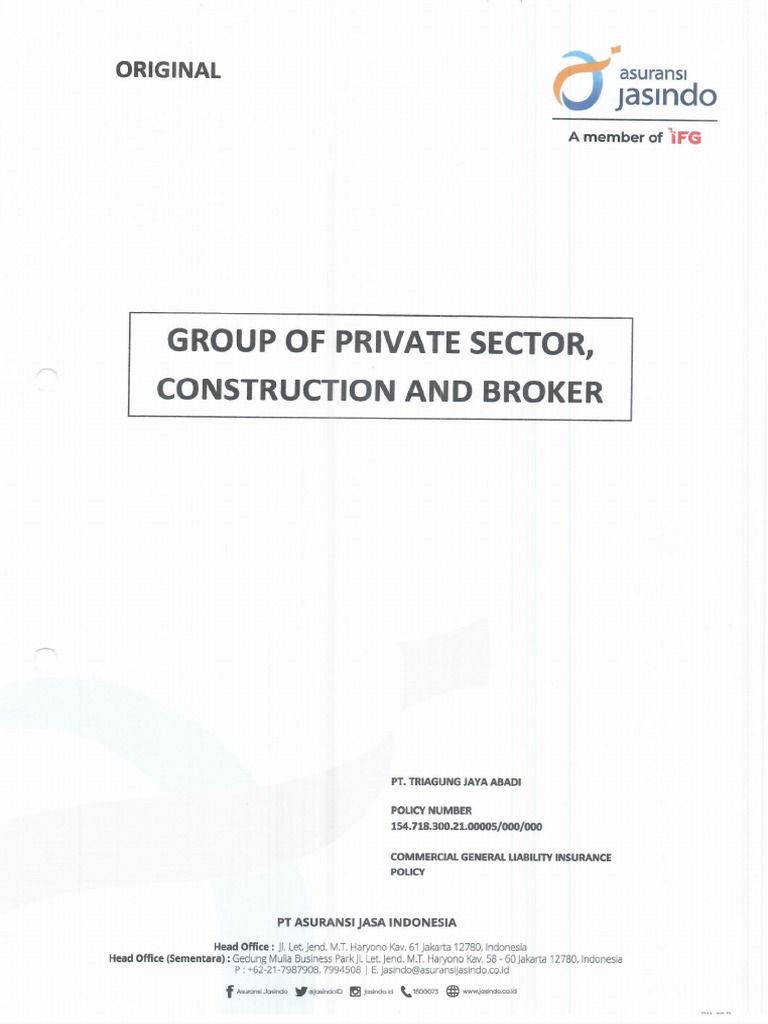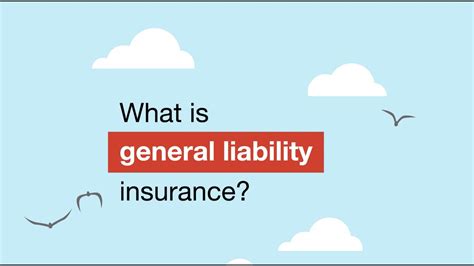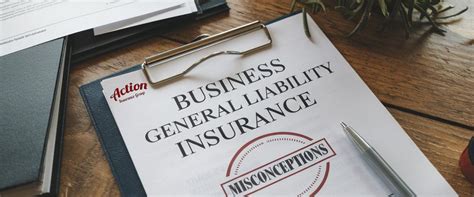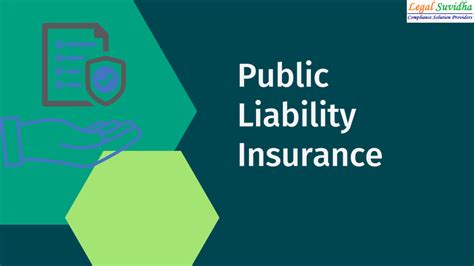Liablity Insurance

Liability insurance is a crucial aspect of personal and business risk management, offering protection against potential financial losses arising from unforeseen events. This comprehensive guide aims to delve into the intricacies of liability insurance, providing an in-depth understanding of its importance, coverage, and implications for individuals and enterprises.
Understanding Liability Insurance

Liability insurance, often referred to as third-party insurance, is a contractual agreement between an insured party (individual or entity) and an insurance provider. This agreement ensures financial coverage in the event of legal liabilities arising from bodily injury, property damage, or other specified losses caused by the insured to a third party. In essence, it provides a safety net against the potentially ruinous financial consequences of being held legally responsible for such damages.
Key Components of Liability Insurance
- Policy Limits: This refers to the maximum amount the insurance company will pay for a covered claim. Policy limits can vary significantly depending on the type of liability insurance and the specific policy.
- Deductibles: A deductible is the amount the insured party must pay out of pocket before the insurance coverage kicks in. Higher deductibles often result in lower premium costs.
- Coverage Types: Liability insurance policies can cover a wide range of potential liabilities, including personal injury, property damage, professional liability (for errors and omissions), product liability, and more. The specific coverage types depend on the policy and the needs of the insured.
Importance of Liability Insurance

In today’s complex and litigious world, the significance of liability insurance cannot be overstated. Here’s a closer look at why this form of insurance is indispensable for both individuals and businesses.
Financial Protection for Individuals
For individuals, liability insurance is a vital safeguard against unforeseen circumstances that could lead to substantial financial liabilities. Imagine an accident occurring on your property, resulting in injuries to a visitor. Without liability insurance, you could be held personally responsible for medical bills, pain and suffering, and potentially even lost wages. The financial implications could be devastating, especially if the injured party pursues legal action.
Essential for Businesses
Businesses face a myriad of potential liabilities daily, from customer injuries on their premises to product defects causing harm. Liability insurance provides a critical safety net, offering coverage for legal defense costs and any financial settlements or judgments resulting from such claims. This not only protects the business’s financial stability but also its reputation, as it demonstrates a commitment to taking responsibility for potential harms caused.
Types of Liability Insurance
Liability insurance is not a one-size-fits-all solution. Different types of liability insurance exist to address specific risks and scenarios. Understanding these variations is essential to ensure adequate coverage.
General Liability Insurance
General liability insurance, often the foundation of a business’s insurance portfolio, provides broad coverage for various common risks. It typically covers bodily injury, property damage, personal and advertising injury, and medical payments. This type of insurance is especially crucial for businesses that interact with the public, as it can cover a range of potential accidents or incidents that may occur on their premises or as a result of their operations.
| Coverage Category | Description |
|---|---|
| Bodily Injury | Covers medical expenses, pain and suffering, and other related costs when a customer or visitor is injured on your business premises. |
| Property Damage | Provides coverage for damage to or loss of someone else's property, whether accidental or due to negligence. |
| Personal and Advertising Injury | Protects against claims of defamation, copyright infringement, or other similar offenses arising from your business's advertising or public relations activities. |
| Medical Payments | Covers the medical expenses of injured parties, regardless of fault, up to the policy limit. |

Professional Liability Insurance
Also known as errors and omissions (E&O) insurance, professional liability insurance is designed to protect professionals, such as consultants, accountants, lawyers, and real estate agents, against claims of negligence, omissions, or errors in the services they provide. This type of insurance is essential for professionals who offer advice or services that could potentially lead to financial losses for their clients.
Product Liability Insurance
Product liability insurance is a critical component for businesses that manufacture, distribute, or sell products. It provides coverage if a product causes harm to a consumer, even if the product was not designed or manufactured by the insured. This insurance is essential to protect against the potentially catastrophic financial consequences of product recalls, lawsuits, and other related issues.
Other Types of Liability Insurance
There are numerous other types of liability insurance, each tailored to specific industries and risks. These include directors and officers (D&O) liability insurance for corporate boards, cyber liability insurance for digital risks, and employment practices liability insurance (EPLI) to protect against claims of workplace discrimination, harassment, or wrongful termination.
How Liability Insurance Works
Liability insurance operates based on a straightforward principle: it provides financial protection when the insured is held legally responsible for causing harm to a third party. The process typically involves the following steps:
Filing a Claim
When an incident occurs that may result in a liability claim, the insured must notify their insurance provider promptly. This notification initiates the claim process, and the insurer will then assign an adjuster to investigate the claim.
Investigation and Adjustment
The insurance adjuster investigates the claim, gathering evidence and determining the facts of the incident. They will assess the validity of the claim, the extent of the damages, and whether the policy covers the specific situation.
Determining Coverage and Settlement
Once the investigation is complete, the insurance company will determine whether the claim is covered under the policy. If it is, they will negotiate a settlement with the claimant or their legal representative. The settlement amount is typically based on the policy limits, the severity of the damages, and any applicable deductibles.
Legal Defense
In some cases, the claimant may file a lawsuit against the insured. In such situations, liability insurance often includes coverage for legal defense costs. The insurance company will appoint a lawyer to defend the insured, protecting their financial interests and ensuring they receive a fair legal representation.
The Benefits of Liability Insurance

Liability insurance offers a range of benefits that make it an indispensable tool for risk management. Here’s a closer look at some of these advantages:
Financial Security
The primary benefit of liability insurance is financial security. It provides a safety net, protecting individuals and businesses from potentially catastrophic financial losses resulting from legal liabilities. By transferring the financial risk to the insurance company, the insured can focus on their core activities without the constant worry of unforeseen liabilities.
Peace of Mind
Knowing you have adequate liability insurance coverage can bring immense peace of mind. It allows individuals and business owners to focus on their lives and operations without constantly worrying about the financial implications of unforeseen events. This peace of mind is invaluable, enabling them to sleep better at night and approach their daily activities with confidence.
Enhanced Reputation
For businesses, having liability insurance demonstrates a commitment to ethical practices and a willingness to take responsibility for potential harms caused. This can enhance the company’s reputation, fostering trust among customers, employees, and stakeholders. It signals that the business is proactive in managing risks and is prepared to handle unforeseen circumstances responsibly.
Choosing the Right Liability Insurance
Selecting the appropriate liability insurance coverage is a critical decision that requires careful consideration. Here are some key factors to keep in mind when choosing a liability insurance policy:
Assess Your Risks
The first step in choosing liability insurance is understanding your unique risks. Consider the nature of your business, the services or products you offer, and the potential liabilities that could arise. For individuals, assess your personal circumstances, including your assets, the activities you engage in, and the potential risks associated with them.
Policy Limits and Deductibles
When reviewing liability insurance policies, pay close attention to the policy limits and deductibles. Ensure that the limits are sufficient to cover potential claims, taking into account the value of your assets and the potential severity of losses. Similarly, consider your financial situation when choosing deductibles. While higher deductibles can result in lower premiums, they also mean you’ll need to pay more out of pocket before the insurance coverage kicks in.
Tailored Coverage
Different businesses and individuals have different needs. Look for liability insurance policies that offer tailored coverage options. This ensures you get the specific protection you need, whether it’s for a unique business operation, a specific product line, or a particular professional service.
Reputable Insurance Providers
Choose liability insurance from reputable and financially stable insurance companies. Research the provider’s track record, customer reviews, and financial strength ratings. This ensures that the company will be able to honor its commitments and pay out valid claims, even in the event of multiple large-scale claims.
Future Trends in Liability Insurance
The liability insurance landscape is continually evolving, driven by changing risk profiles, technological advancements, and shifts in societal expectations. Here are some key trends to watch in the coming years:
Growing Importance of Cyber Liability
With the increasing reliance on technology and the rise of cyber threats, cyber liability insurance is becoming an essential component of comprehensive liability coverage. As more businesses move online and collect sensitive customer data, the risk of cyber attacks and data breaches grows. Cyber liability insurance provides protection against these risks, covering costs associated with data breaches, system failures, and other cyber-related incidents.
Emerging Risks and New Coverage
As technology advances and new industries emerge, new risks arise that were previously unforeseen. For example, the rise of autonomous vehicles has given birth to new liability concerns, prompting the development of specialized insurance coverage for this emerging technology. Similarly, the growing popularity of ride-sharing services has led to the creation of new liability insurance products tailored to these unique business models.
Focus on Risk Prevention
While liability insurance provides crucial financial protection, preventing risks in the first place is always preferable. Insurance providers are increasingly offering risk management services and resources to help policyholders identify and mitigate potential risks. This shift towards risk prevention not only reduces the likelihood of claims but also enhances the overall safety and efficiency of businesses and individuals.
Conclusion
Liability insurance is a critical component of a robust risk management strategy, offering financial protection against a wide range of potential liabilities. Whether you’re an individual looking to safeguard your personal assets or a business aiming to protect your operations and reputation, understanding liability insurance and choosing the right coverage is essential. By staying informed, assessing your unique risks, and working with reputable insurance providers, you can ensure you have the protection you need to face the future with confidence.
What is the difference between liability insurance and other types of insurance like property or health insurance?
+
Liability insurance differs from property and health insurance in that it provides coverage for legal liabilities arising from harm caused to a third party. Property insurance covers damage to your own property, while health insurance covers your own medical expenses. Liability insurance, on the other hand, protects you financially if you’re found legally responsible for causing harm to someone else or their property.
Is liability insurance mandatory for businesses?
+
While liability insurance isn’t always legally mandated for businesses, it’s highly recommended. Many businesses choose to carry liability insurance to protect their assets and reputation. In some industries or for certain types of businesses, liability insurance may be required by law or by contractual agreements with clients or partners.
How much does liability insurance typically cost?
+
The cost of liability insurance can vary widely depending on several factors, including the type of business, the industry, the amount of coverage needed, and the specific risks involved. It’s best to consult with an insurance professional who can provide you with an accurate quote based on your unique circumstances.



